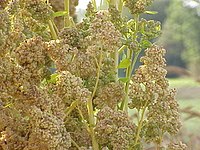
Photo from wikipedia
BACKGROUND Rice yield and grain quality are highly sensitive to soil salinity. Distinct rice genotypes respond to salinity stress differently. To explore the variation in grain yield and grain trait… Click to show full abstract
BACKGROUND Rice yield and grain quality are highly sensitive to soil salinity. Distinct rice genotypes respond to salinity stress differently. To explore the variation in grain yield and grain trait adaptation to moderate, reproductive-stage salinity stress (4 dS/m electrical conductivity), four rice cultivars differing in degrees of vegetative salt tolerance, including Pokkali (salt-tolerant), RD15 (moderately salt-tolerant), KDML105 (moderately salt-susceptible) and IR29 (salt-susceptible), were examined. RESULTS Grain fertility and 100-grain weight of RD15, KDML105 and IR29, as well as grain morphology of KDML105 and IR29, were significantly disturbed. Interestingly, grain starch accumulation in RD15 and KDML105 was enhanced under stress. However, only RD15 showed changes in starch physicochemical properties, including increased granule diameter, decreased gelatinization peak temperature (Tp ) and decreased retrogradation onset temperature (To ). Notably, Pokkali maintained productivity, grain quality, and starch properties, while the grain quality of IR29 remained unchanged under salinity stress. Multivariate analysis displayed clear separation of productivity, grain morphology, and starch variables of RD15 in the salt-treated group relative to the control group, suggesting that it was the cultivar most impacted by salt stress despite its moderate salt-tolerance at vegetative stage. CONCLUSION Our results demonstrate specific salinity responses among the rice genotypes, and suggest discrepancies between degrees of salt tolerance at vegetative stage vs. the ability to maintain both grain quality and starch properties in response to salinity stress imposed at reproductive stage. This article is protected by copyright. All rights reserved.
Journal Title: Journal of the science of food and agriculture
Year Published: 2021
Link to full text (if available)
Share on Social Media: Sign Up to like & get
recommendations!